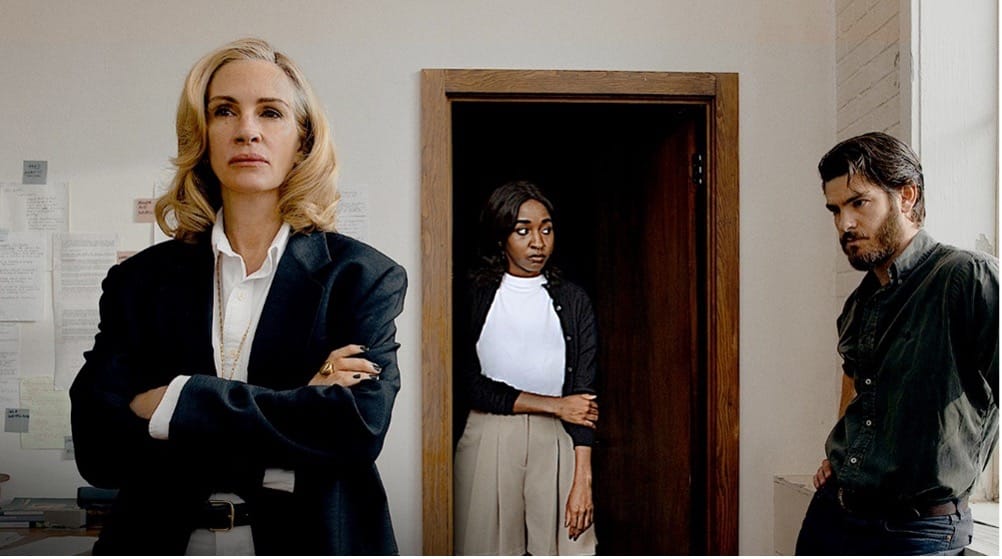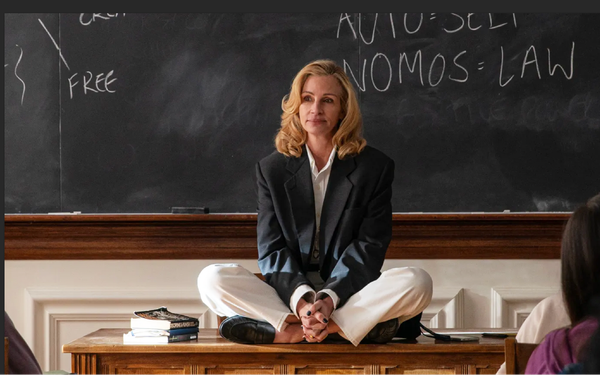★★½ (2½ out of 4)
Critics have been taking shots at “After the Hunt” since Luca Guadagnino’s star-bedazzled conversation piece debuted at the Venice Film Festival in August. Now, after the film’s high-profile stint as the opening night attraction at the New York Film Festival, where the digs continued, “After the Hunt” arrives in theaters where everyone can have it.
Do your worst, fellow filmgoers. But “After the Hunt” stubbornly lingers in the memory no matter how eager we may be to delete its blowhard pretensions from our personal hard drives. It digs in deep and gets to you.
Set at Yale University in 2019 at the height of #MeToo, the film uses black-and-white opening credits that directly evoke Woody Allen, a poster boy for cancel culture. It’s also Woody-like that the film zeroes in on the university’s philosophy department where every topic is intellectualized to bursting without ever coming to a concrete conclusion.
That’s “After the Hunt” in a nutshell, a teasing provocation for which the frustrating script by first-timer Nora Garret provides no guideposts. This is not the fault of the actors. Julia Roberts avidly nails her juiciest role in years (2004’s “Closer” might be the last goody) as Alma Imhoff, a philosophy prof whose smile can’t hide her interior calculation.

Guadagnino introduces Alma at a party in the posh New Haven apartment she shares with her psychiatrist husband Frederick (Michael Stuhlbarg). The festivities are winding down, as Alma converses with her colleague and maybe more Hank Gibson (Andrew Garfield) and Maggie Resnick (Ayo Edebiri), Alma's student protégée: Frederick has already chided Alma that Maggie is a “mediocre” student who is only added to the inner circle because she idolizes his wife. The same goes for the aggressively flirty Hank.
Be warned. There’s nothing fun or frisky about “After the Hunt.” A metronome intrudes on the strangely insistent score from Trent Reznor and Atticus Ross, tick-tocking away as if a bomb is about to go off.
It does, at least metaphorically. A few days later, a shellshocked Maggie informs Alma that Hank took her home after the party and sexually assaulted her. Maggie wants to expose him. Alma advises caution. Out of loyalty to Hank or to duck charges of guilt by association that might prod Yale to deny Alma her well-deserved tenure?
'After the Hunt' stubbornly lingers in the memory no matter how eager we may be to delete its blow hard pretensions from our personal hard drives. It digs in deep and gets to you.
The movie offers scant explanation. Even an epilogue set five years later for a new context that comes with time provides no closure. Guadagnino wants each viewer to supply that. Is it a challenge or a copout? I’d say a bit of both. The script paints every major character as a liar and a cheat. It’s up to the actors to provide gradations of honesty and feeling.
Garfield tries his best until the script hits on sleaze as Hank’s defining characteristic. And Edebiri, a two-time Emmy-winner for “The Bear,” has it worse. The script sees Maggie as a poor little rich queer Black girl who uses white male dominance as an excuse to squeeze her way out of tight corners. The film’s detractors regard Maggie’s behavior as potentially undermining the #MeToo movement by reviving debates on whether to believe accusers.
What I see in After the Hunt” at its best is an attempt to comprehend #MeToo from two generational perspectives: Maggie wanting to get her version of the facts out there - damn the consequences, and Alma to hide the truth to avoid becoming radioactive in a world still controlled by the white patriarchy.
Roberts is given several powerful scenes where Alma can unleash feelings she’s left to fester. When Maggie tells her mentor that she’s making her uncomfortable, Alma goes on the Gen-Z offensive: “Not everything is supposed to make you feel comfortable.” Roberts, jaw set and eyes flashing, spits out that line like no other actor could.
So are we on Alma’s side? Not so fast. Guadagnino wants us to understand ourselves and the world through rigorous argument and logical analysis, rather than faith or tradition or personal prejudices. That sounds a lot like a definition of philosophy. And a lot like “After the Hunt” when it stops dawdling and fires on all cylinders.

